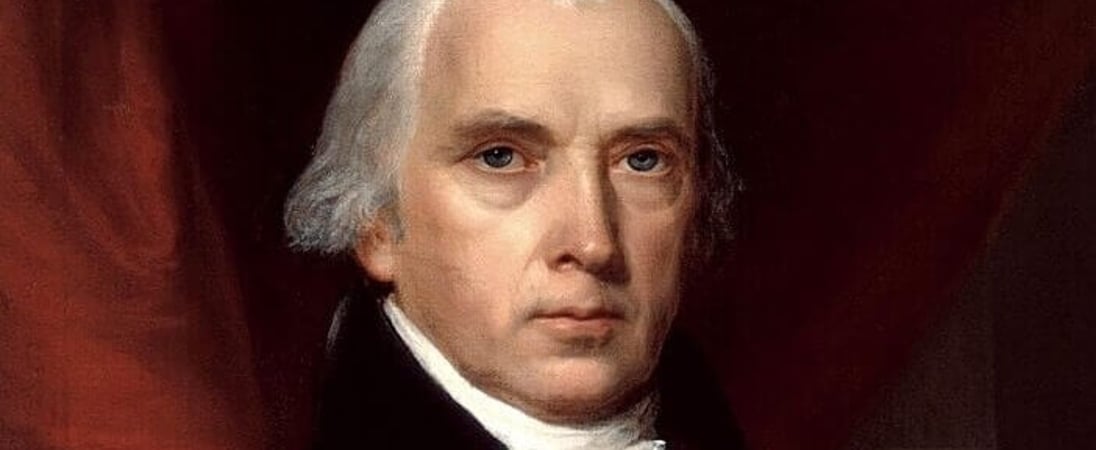
James Madison's birthday
James Madison, born on March 16, 1751, was a key figure in shaping the United States. He worked hard to draft and promote the U.S. Constitution, earning him the title “Father of the Constitution.”
Madison also co-wrote the Federalist Papers, important essays supporting the Constitution. Later, he served as the fourth President of the United States, leading the country through the War of 1812. Throughout his life, Madison aimed to improve the nation and ensure its success.
James Madison’s Early Years and Education
James Madison was born on March 16, 1751, in Virginia, into a wealthy family. As the eldest of twelve children, he grew up on a plantation. Early health issues didn’t stop him from developing a love for reading and learning.
Madison’s education began at home, under Scottish tutor Donald Robertson. He excelled in subjects like mathematics and languages. Later, the Reverend Thomas Martin prepared him for college, focusing on advanced topics.
He attended the College of New Jersey, now Princeton University. There, Madison completed his studies quickly and even studied Hebrew and philosophy after graduation.
Returning to Montpelier, he studied law but found his passion in politics. His first political role was on the local Committee of Safety in 1774, starting his journey into public service.
Madison’s early experiences, from overcoming health challenges to pursuing rigorous academic work, set the stage for his future contributions to American politics and governance.
James Madison’s Legacy of Leadership and Innovation
James Madison, the fourth President of the United States, left a permanent mark on American history through his leadership and achievements. His presidency, from 1809 to 1817, was a period of significant challenges and accomplishments.
Leading the Nation Through War and Peace
Madison led the United States through the difficult War of 1812 against Britain, facing a superior enemy and internal divisions.
Despite initial setbacks, including the burning of Washington D.C., American forces managed to secure key victories in New York, Baltimore, and New Orleans.
The Treaty of Ghent, which ended the war, restored relations to their pre-war status and ushered in an era known as the “Era of Good Feelings,” marked by national pride and unity.
Domestic Affairs and the Economy
In the aftermath of the war, Madison focused on strengthening the U.S. economy. He oversaw the establishment of the Second Bank of the United States and implemented the Tariff of 1816 to protect American industries.
These measures helped to stabilize the economy and promote domestic manufacturing, contributing to a period of unprecedented prosperity.
A Founding Father’s Vision for America
Madison’s role as a key architect of the Constitution and the Bill of Rights has earned him the title “Father of the Constitution.”
He was instrumental in drafting the Virginia Plan, which proposed a federal government with a balance of powers and worked tirelessly to ensure the Constitution’s ratification.
Madison, alongside Alexander Hamilton and John Jay, also contributed to the Federalist Papers, advocating for the Constitution’s adoption.
Personal Ventures and Legacy
Beyond his public achievements, Madison’s personal life and ventures also reflect his character and beliefs.
He was married to Dolley Payne Todd, who played a significant role in his political success and popularity. Together, they created a welcoming atmosphere in the White House that helped foster political collaboration.
Madison’s impact extends beyond his presidency. He co-founded the Democratic-Republican Party with Thomas Jefferson, opposing the centralization of power and advocating for states’ rights and a smaller federal government.
His thoughtful and studious nature, keen political insight, and ability to influence legislation and policy have cemented his place as one of America’s most influential Founding Fathers.
In summary, James Madison’s presidency and life achievements reflect a deep commitment to the principles of democracy, liberty, and governance.
His contributions to the Constitution, leadership during the War of 1812, and efforts to stabilize and grow the nation’s economy demonstrate a legacy of enduring impact on the United States.
Interesting Facts About James Madison
Initially Opposed the Bill of Rights: Madison originally believed the Bill of Rights was unnecessary, fearing it might limit unlisted rights. His view changed when he realized its importance for the Constitution’s ratification.
Dolley Madison’s Role as First Lady: Dolley Madison helped define the role of the First Lady, hosting the first Inaugural Ball and redecorating the White House.
Survived Two Vice Presidents: Madison outlived both of his vice presidents, George Clinton and Elbridge Gerry, who died in office.
Accompanied Troops in Battle: Unique among presidents, Madison directly joined troops during the War of 1812’s defense of Washington, D.C..
Health Struggles: Madison frequently suffered from stomach aches and conditions resembling epilepsy throughout his life.
Used Secret Codes: Fearful of intercepted letters, Madison and his allies, including Jefferson, used complex encryption for sensitive communications.
Also on this date...
National Panda Day
Nature's cuddly ambassadors, with a diet that's 99% bamboo and an unmistakable appearance that's sure to melt your heart.
National Lips Appreciation Day
Admiring the unique curve that adds personality to a smile, appreciating the canvas that speaks without words—lips have their own story.
National Artichoke Day
Green and spiky, a culinary delight with tender hearts concealed, waiting to be savored, offering a taste of earthy goodness.




